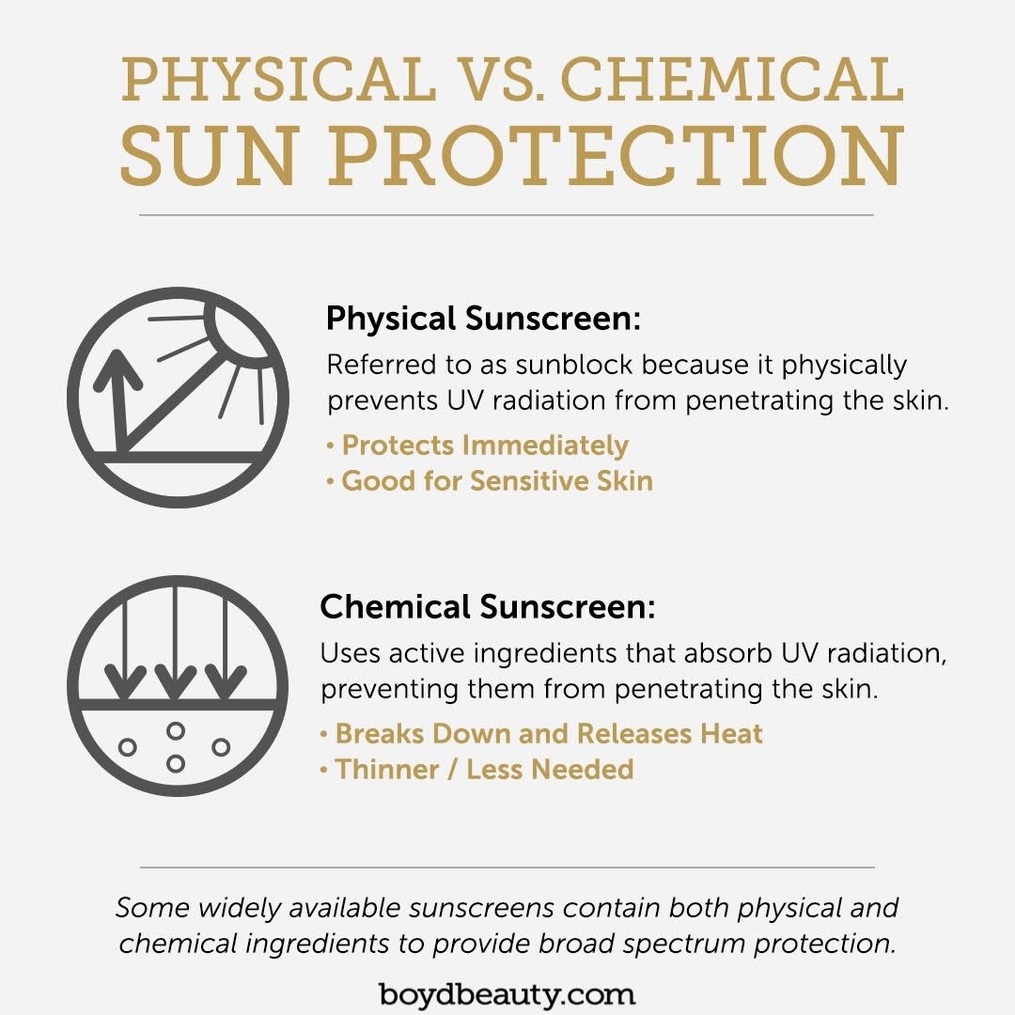
Everything You Need to Know About Sunscreen
Summer has officially arrived, which means you’ll likely be spending more time outdoors. While most everyone enjoys a sunny day, not everyone remembers to apply sunscreen to protect their skin. According to the Skin Cancer Foundation, one in five Americans will develop skin cancer over the course of his or her lifetime. Because of this, it is very important that both men and women apply sunscreen whenever spending time outside or in the sun.
What many people do not know is that there is more than one type of sunscreen on the market today. While chemical and physical sunscreens work to protect your skin, there are some main differences that you should be aware of.
Regular Sunscreen AKA Chemical Sunscreen
Chemical sunscreens use active ingredients that absorb UV radiation, preventing them from penetrating the skin. Many sunscreens on the market contain chemical fillers. These include a combination of two to six of these active ingredients: oxybenzone, avobenzone, octisalate, octocrylene, homosalate, and octinoxate. These sunscreens tend to be thinner, making it easier for everyday use, and less is needed for protection. These formulas may include peptides and enzymes to offer skin benefits. Over time, some chemical filters slowly break down and release heat. While all physical UV filters block from both UVA and UVB rays, most chemical UV filters protect one or the other, not both.

Physical Sunscreen
Physical sunscreen is often referred to as sunblock. It contains ingredients like titanium dioxide and zinc oxide, which physically block ultraviolet radiation. Most physical sunscreens offer protection against both UVA and UVB rays. They also start protecting the skin from the sun immediately after it is applied. It is long-lasting in direct UV light, except when doing physical activities that cause the skin to get wet or sweat. This sunscreen is good for sensitive skin types and acne-prone skin, as it is less likely to clog pores.
Some widely available sunscreens contain both physical and chemical ingredients to provide broad spectrum protection. Next time you are purchasing sunscreen, pay attention to whether it is chemical, physical, or both, as this can tell you more about how it protects your skin.
Protect Your Skin
Individuals of all skin tones should regularly wear sunscreen when spending time outdoors to decrease their chances of skin damage. At BOYD, we recommend an array of clinically tested products to help keep your skin healthy and beautiful. These include:
– Skinceuticals Physical Fusion UV defense SPF 50
– SkinMedica Essential Defense SPF 35
– SkinMedica Total Defense + Repair SPF 34
– Detroit Skin Beauty Balm SPF 40
 Since opening his practice, Dr. Charles M. Boyd has earned an excellent reputation, both nationally and internationally, for a holistic approach, quality results, and outstanding patient care. Dr. Boyd graduated from Harvard Medical School and has an MBA from the University of Michigan. He is double board certified by the American Board of Facial Plastic Reconstructive Surgery and the American Board of Otolaryngology Head and Neck Surgery.
Since opening his practice, Dr. Charles M. Boyd has earned an excellent reputation, both nationally and internationally, for a holistic approach, quality results, and outstanding patient care. Dr. Boyd graduated from Harvard Medical School and has an MBA from the University of Michigan. He is double board certified by the American Board of Facial Plastic Reconstructive Surgery and the American Board of Otolaryngology Head and Neck Surgery.
Dr. Boyd has authored book chapters on cosmetic surgery, as well as published his research in several medical and surgical journals. Numerous media outlets and newspapers, such as the Wall Street Journal, Boston Globe, and the Washington post have featured his work. He currently trains physicians in the latest procedures and also lectures throughout the country on advanced injection techniques. As a result of his ongoing clinical research and teaching, Dr. Boyd evaluates many emerging technologies, bringing only the best and latest innovations to his patients.
To learn more, visit BOYD Beauty.


